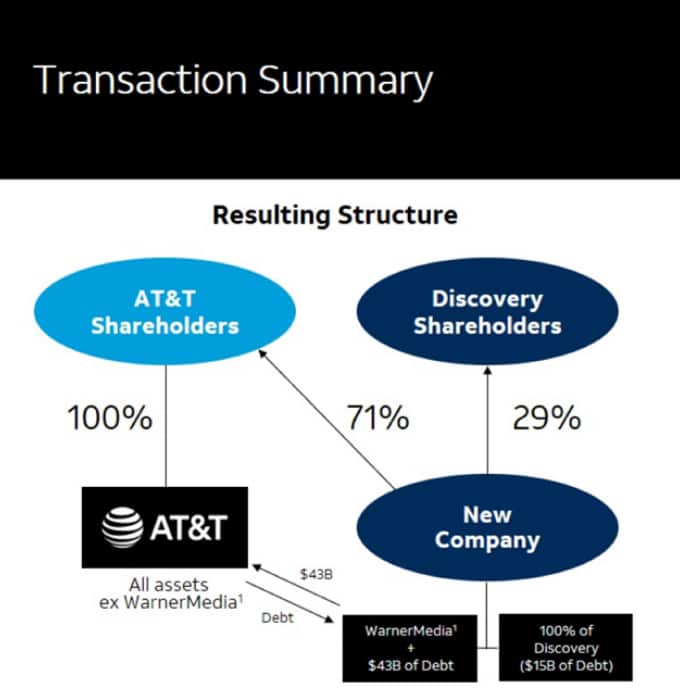AT&T and Discovery, Inc. said today that they have agreed to combine Discovery’s entertainment assets with AT&T’s WarnerMedia assets. If approved by regulators, the deal is expected to close in mid-2022.
The combination of WarnerMedia and Discovery entertainment, sports and news assets will accelerate plans for direct-to-consumer streaming, AT&T and Discovery said. It also brings AT&T $43 billion in cash that the company expects to use for “stepped-up investment in growth areas – mobile and fixed broadband.”
Plans call for AT&T stockholders to own 71% of the new company, while Discovery shareholders would own 29%.
“The agreement unites two entertainment leaders with complementary content strengths and positions the new company to be one of the leading global direct-to-consumer streaming platforms,” said AT&T CEO John Stankey in a press release announcing the AT&T Discovery deal. “It will support the fantastic growth and international launch of HBO Max with Discovery’s global footprint and create efficiencies which can be reinvested in producing more great content to give consumers what they want. For AT&T shareholders, this is an opportunity to unlock value and be one of the best capitalized broadband companies, focused on investing in 5G and fiber to meet substantial, long-term demand for connectivity.”
Assets of the new company will include HBO, Warner Bros., Discovery, DC Comics, CNN, Cartoon Network, HGTV, Food Network, the Turner Networks, TNT, TBS, Magnolia, TLC, Animal Planet and more.
Broadband financial analysts at MoffettNathanson estimate that the combined company will be “the largest home of linear impressions” and will command 28% of 2020 U.S. viewing time and 24% of U.S. national advertising.
The AT&T Discovery news comes just three months after AT&T announced plans to sell 30% of its DIRECTV and other linear video assets, including AT&T TV and U-verse video to TPG Capital. That deal, expected to close this year, is similar to the AT&T Discovery deal in that it also would bring cash to AT&T for its core connectivity business.
AT&T’s subscription video on demand offering, HBO Max, was not part of the TPG deal.
AT&T bought WarnerMedia in the belief that ownership of video assets would enable the company to provide more than what are sometimes called “dumb pipe” connectivity services. But some have questioned whether the company has the capital to support both the video and connectivity businesses.
The company was the second largest winning bidder in the recent record-breaking auction of C-band spectrum for 5G and has committed to spending over $23 billion on that spectrum. To put things in perspective, that’s more than half the money the company will yield from the Discovery deal.




